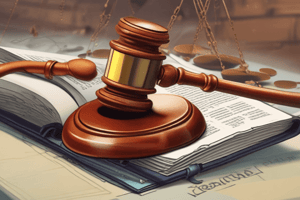Podcast
Questions and Answers
Which statement regarding tort is incorrect?
Which statement regarding tort is incorrect?
- Tort arises from a generalized legal duty to avoid causing harm to others.
- Tort can arise through acts of omission, as well as commission.
- Tort arises from an explicit promissory agreement between the parties to the action. (correct)
- Tort denotes a common law civil wrong for which a court will provide a remedy.
Which of the following is not considered when determining the existence of a duty to warn?
Which of the following is not considered when determining the existence of a duty to warn?
- Potential for an accident when the product is used without warning.
- Probable seriousness of injuries.
- Laws or regulations applicable to the warning. (correct)
- Effectiveness and feasibility of a warning.
Which agency regulates the safety of automobile fuels?
Which agency regulates the safety of automobile fuels?
- OSHA
- CPSC (correct)
- DOT
- EPA
In a transaction where Company A sells to Company B, which entity does 'privity' exist between?
In a transaction where Company A sells to Company B, which entity does 'privity' exist between?
Which item is NOT part of the certification label required by the Consumer Products Safety Act?
Which item is NOT part of the certification label required by the Consumer Products Safety Act?
Which situation eliminates the need for a consumer product warning label?
Which situation eliminates the need for a consumer product warning label?
Which statement about consumer product warning labels is incorrect?
Which statement about consumer product warning labels is incorrect?
Which act primarily addresses the rights of individuals with disabilities?
Which act primarily addresses the rights of individuals with disabilities?
What does 'res ipsa loquitur' imply in product safety litigation?
What does 'res ipsa loquitur' imply in product safety litigation?
When does the product liability statute of limitations begin to apply?
When does the product liability statute of limitations begin to apply?
Which statement is NOT true about the OSHA Hazard Communication Standard?
Which statement is NOT true about the OSHA Hazard Communication Standard?
What are punitive damages also referred to as in tort law?
What are punitive damages also referred to as in tort law?
What is the definition of 'Anticipatory Breach of Contract'?
What is the definition of 'Anticipatory Breach of Contract'?
What is the correct initial action for a CSP upon discovering a corroded pipe carrying a highly toxic chemical?
What is the correct initial action for a CSP upon discovering a corroded pipe carrying a highly toxic chemical?
Which of the following actions is appropriate when conducting a HAZOP as a CSP?
Which of the following actions is appropriate when conducting a HAZOP as a CSP?
Which of the following acts are focused mainly on workplace safety and health?
Which of the following acts are focused mainly on workplace safety and health?
Which statement about ethics is NOT true?
Which statement about ethics is NOT true?
Which warranty is defined as needing no written expression to be valid?
Which warranty is defined as needing no written expression to be valid?
The term 'exemplary damages' is synonymous with which of the following?
The term 'exemplary damages' is synonymous with which of the following?
What should a CSP do when reviewing a pressure vessel design that they feel unqualified to approve?
What should a CSP do when reviewing a pressure vessel design that they feel unqualified to approve?
When writing a formal complaint, which of the following steps is required?
When writing a formal complaint, which of the following steps is required?
Which of the following actions is NOT considered a form of unethical behavior?
Which of the following actions is NOT considered a form of unethical behavior?
Which of the following is NOT one of the canons of professional conduct set by the Board of Certified Safety Professionals?
Which of the following is NOT one of the canons of professional conduct set by the Board of Certified Safety Professionals?
What is the MOST appropriate action for a safety professional upon discovering an imminent danger hazard?
What is the MOST appropriate action for a safety professional upon discovering an imminent danger hazard?
Which factor does NOT typically affect ethical decision making?
Which factor does NOT typically affect ethical decision making?
What is the minimum percentage of safety-related materials required for conference attendance to earn COC points?
What is the minimum percentage of safety-related materials required for conference attendance to earn COC points?
How many COC points can be earned for attending a 2-day professional conference with at least 50% safety content?
How many COC points can be earned for attending a 2-day professional conference with at least 50% safety content?
Which statement is true regarding a safety professional who follows the profession’s code of ethics?
Which statement is true regarding a safety professional who follows the profession’s code of ethics?
What is the required procedure for submitting charges of unethical conduct against a Certified Safety Professional?
What is the required procedure for submitting charges of unethical conduct against a Certified Safety Professional?
What is NOT an ethical consideration for safety professionals in decision-making?
What is NOT an ethical consideration for safety professionals in decision-making?
Which of the following actions would violate the ethical standards expected of safety professionals?
Which of the following actions would violate the ethical standards expected of safety professionals?
What is another term for anticipatory breach?
What is another term for anticipatory breach?
What term is used in contracts for protection against natural catastrophes?
What term is used in contracts for protection against natural catastrophes?
What type of contract is formed when a consumer leases a car from a dealership?
What type of contract is formed when a consumer leases a car from a dealership?
In disability terminology, what does 'Quadriplegic' refer to?
In disability terminology, what does 'Quadriplegic' refer to?
What condition is referenced by the term 'demented' in disability terminology?
What condition is referenced by the term 'demented' in disability terminology?
What does the term 'epileptic' describe?
What does the term 'epileptic' describe?
Which legal framework is in place to protect a company's trade secrets in the U.S.?
Which legal framework is in place to protect a company's trade secrets in the U.S.?
What element of a valid contract is violated when a buyer is misled about the item being sold?
What element of a valid contract is violated when a buyer is misled about the item being sold?
Which of the following is NOT an essential element of a valid contract?
Which of the following is NOT an essential element of a valid contract?
Which factor can lead to consent not being considered free in a contract?
Which factor can lead to consent not being considered free in a contract?
Flashcards
What is tort?
What is tort?
Tort law refers to civil wrongs that cause harm to others. It can be intentional or unintentional and usually leads to court-ordered remedies to compensate the harmed party.
What is the 'duty to warn' in product liability?
What is the 'duty to warn' in product liability?
A duty to warn is a legal obligation placed on manufacturers to inform consumers about potential dangers associated with their products. This duty arises when the product can cause harm if used without proper warnings.
What is 'privity' in a product liability case?
What is 'privity' in a product liability case?
Privity exists when there is a direct, contractual relationship between two parties in a business transaction. For example, a manufacturer selling directly to a retailer has privity with the retailer but not with the end consumer who buys the product from the retailer.
What is the Consumer Products Safety Act (CPSA)?
What is the Consumer Products Safety Act (CPSA)?
Signup and view all the flashcards
When is a consumer product warning label not required?
When is a consumer product warning label not required?
Signup and view all the flashcards
What are the essential components of a consumer product warning label?
What are the essential components of a consumer product warning label?
Signup and view all the flashcards
Which agency regulates workplace safety standards?
Which agency regulates workplace safety standards?
Signup and view all the flashcards
OSHA
OSHA
Signup and view all the flashcards
Res Ipsa Loquitur
Res Ipsa Loquitur
Signup and view all the flashcards
Tort Law
Tort Law
Signup and view all the flashcards
Punitive Damages
Punitive Damages
Signup and view all the flashcards
Anticipatory Breach of Contract
Anticipatory Breach of Contract
Signup and view all the flashcards
Americans with Disabilities Act (ADA)
Americans with Disabilities Act (ADA)
Signup and view all the flashcards
Statute of Limitations
Statute of Limitations
Signup and view all the flashcards
Product Liability Litigation
Product Liability Litigation
Signup and view all the flashcards
Safety Data Sheet (SDS)
Safety Data Sheet (SDS)
Signup and view all the flashcards
CSP Approving Designs
CSP Approving Designs
Signup and view all the flashcards
CSP's First Step in a Hazard
CSP's First Step in a Hazard
Signup and view all the flashcards
Ethics: What's it all about?
Ethics: What's it all about?
Signup and view all the flashcards
CSP's Role in HAZOP
CSP's Role in HAZOP
Signup and view all the flashcards
CSP Accepting Payment for HAZOP
CSP Accepting Payment for HAZOP
Signup and view all the flashcards
Fraud
Fraud
Signup and view all the flashcards
Misrepresentation
Misrepresentation
Signup and view all the flashcards
Coercion
Coercion
Signup and view all the flashcards
Canons of Professional Conduct for Safety Professionals
Canons of Professional Conduct for Safety Professionals
Signup and view all the flashcards
Imminent Danger Hazard
Imminent Danger Hazard
Signup and view all the flashcards
Stage of Moral Development
Stage of Moral Development
Signup and view all the flashcards
Locus of Control
Locus of Control
Signup and view all the flashcards
Safety Related Professional Conference
Safety Related Professional Conference
Signup and view all the flashcards
Continuance of Certification (COC) Points
Continuance of Certification (COC) Points
Signup and view all the flashcards
Ethical Conduct of a Safety Professional
Ethical Conduct of a Safety Professional
Signup and view all the flashcards
Anticipatory Breach
Anticipatory Breach
Signup and view all the flashcards
Force Majeure
Force Majeure
Signup and view all the flashcards
Executory Contract
Executory Contract
Signup and view all the flashcards
Quadriplegic
Quadriplegic
Signup and view all the flashcards
Dementia
Dementia
Signup and view all the flashcards
Epileptic
Epileptic
Signup and view all the flashcards
Uniform Trade Secrets Act (UTSA)
Uniform Trade Secrets Act (UTSA)
Signup and view all the flashcards
Mutual Consent
Mutual Consent
Signup and view all the flashcards
Monetary Considerations
Monetary Considerations
Signup and view all the flashcards
Free Consent
Free Consent
Signup and view all the flashcards
Study Notes
Tort Law
- Tort denotes a common law civil wrong, for which a court provides a remedy.
- Tort arises from a generalized legal duty to avoid causing harm to others.
- Tort can result from acts of omission as well as commission.
- Tort does not arise from an explicit promissory agreement between parties.
Product Liability and Duty to Warn
- Potential for accident (without warning) is a criterion for determining a "duty to warn".
- Probable seriousness of injuries is a criterion for determining a "duty to warn".
- Effectiveness and feasibility of a warning is a criterion for determining a "duty to warn".
- Laws or regulations applicable to the warning are not a criterion for determining a "duty to warn".
Regulatory Agencies
- EPA (Environmental Protection Agency) regulates automobile fuel safety.
- OSHA (Occupational Safety and Health Administration) is not involved in regulating automobile fuel safety.
- DOT (Department of Transportation) is not involved in regulating automobile fuel safety.
- CPSC (Consumer Product Safety Commission) is not involved in regulating automobile fuel safety.
Privity in Product Liability
- Privity exists between a manufacturer and the immediate purchaser who resold the product.
Consumer Product Safety Act
- CPSC identification numbers are not part of certification label requirements for consumer products under the Consumer Product Safety Act.
- A statement of compliance is part of the certification label under the Consumer Product Safety Act.
- Identification of the manufacturer/distributor is part of the certification label.
- Identification of the private labeler is part of the certification label.
Consumer Product Warning Labels
- A warning label is not needed if the danger is obvious.
- A warning label is needed if the potential for harm is foreseeable.
- Warning labels must be effectively communicated.
- The manufacturer/distributor/private labeler is responsible for the provision of the product warning label.
Workers' Rights
- Decisions about worker ability for job tasks need to comply with the Americans With Disabilities Act.
Res Ipsa Loquitur
- "Res ipsa loquitur" is when injury is assumed to result from negligence, which would not normally occur unless someone was negligent.
Product Liability Statute of Limitations
- The statute of limitations for product liability cases starts when an injury occurs.
OSHA Hazard Communication Standard
- The OSHA Hazard Communication Standard (29 CFR 1910.1200) deals with hazardous chemicals.
- The standard requires chemical manufacturers/importers/distributors to create container labels.
- The standard requires chemical manufacturers/importers/distributors to create Safety Data Sheets (SDS).
- The standard does not specify 40 hours of training as a requirement.
Punitive Damages
- Punitive damages are also known as exemplary damages.
Contract Breach
- Anticipatory breach of contract occurs when one party stops performing their contractual duties due to the belief that the other party does not intend to fulfill their contractual duties.
- Anticipatory breach is also known as anticipatory repudiation.
Contract Protection
- Force majeure is a term used in contracts and insurance policies to protect parties if the terms of the contract cannot be fulfilled due to natural and unavoidable catastrophes.
Types of Contracts
- The contract between a consumer and a car dealership for leasing a car is called an executory contract.
Disability Terminology
- "Quadriplegic" refers to a person with a spinal cord injury.
- "Demented" refers to a person with Alzheimer's disease.
- "Epileptic" refers to a person with seizure disorders.
Trade Secrets
- The Uniform Trade Secrets Act (UTSA) protects trade secrets.
- Misappropriation of Trade Secrets Act (MTSA) also regulates trade secrets.
- Federal Trade Secrets Protection Act (FTPSA) does not protect trade secrets.
Contract Elements
- Mutual consent of parties is a requirement for a valid contract.
- Monetary considerations are not an essential element of a valid contract.
- Free consent of parties is another essential element of a valid contract.
- Offer and acceptance are essential elements of a valid contract.
- Lack of fraud, misrepresentation, and coercion are essential for free consent.
Safety Professional Conduct
- The principle of holding safety, health, and public welfare paramount is a key ethical canon for certified safety professionals.
- Objectivity and truthfulness are crucial when issuing public statements.
- Acting as a faithful agent or trustee is essential in representing clients' interests.
- Contacting OSHA with imminent workplace danger that has not been addressed is a major ethical duty.
Ethical Conduct
- Reporting unethical behavior to the proper authority is important.
- Ethically relevant behavior is determined by expertise, rather than making sure everyone follows rules.
Studying That Suits You
Use AI to generate personalized quizzes and flashcards to suit your learning preferences.




